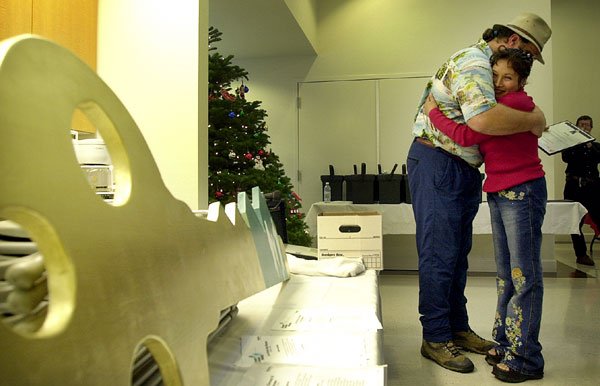
GILROY—Dozens of needy families—maybe more—who built their own “sweat-equity” homes under a program run by a Gilroy affordable housing developer, have lost tens of thousands of dollars by paying mistakenly inflated property tax bills, the Dispatch has learned.
Santa Clara County Assessor Larry Stone Tuesday told the Dispatch about the problem, which was confirmed by his office after a homeowner complained. Stone vowed to make things right for all of the 36 families who have been overbilled and have overpaid property taxes for 13 years.
However, the homeowners said that it was not until Gilroy Mayor Don Gage intervened that the assessor’s office believed there was a problem.
The families live in the Los Arroyos subdivision built by South County Housing Corp.,
located east of Santa Teresa Boulevard off Hirasaki Avenue.
Once a prominent and influential affordable housing builder in four counties, SCH laid off most of its employees and transferred most of its assets during the recession to Eden Housing, a large affordable housing firm with apartments all over the Bay Area and as far south as Gilroy. It maintains a small office in Gilroy and, according to one former employee, will close its doors when a project at the former Fort Ord in Monterey County is completed.
In the current crisis involving the SCH-built homes, there so far is no suggestion of wrongdoing or that the county district attorney’s office is involved.
However, Mayor Don Gage said, “South County Housing is still (in business) and they still have to clean this up.”
Although a county supervisor at the time Los Arroyos was built, around 2002, Gage said it’s his understanding that the city was supposed to alert the assessor’s office that the homes were below-market-rate (BMR), with resale restrictions, which puts them in a different property tax category.
That apparently did not happen, at least not for all the BMR homes, Gage said.
Under the ‘sweat-equity” and other BMR deals, in order for low-income buyers to purchase homes, outfits such as SCH and others work with banks, in this case Wells Fargo Bank, Gage said, to structure affordable mortgages.
For these families, that meant a primary mortgage that they paid off monthly, and a second, silent mortgage that they did not pay on and which would in the future be forgiven, amounting to a taxpayer subsidy.
However, that deal came with a tough restriction; the families had to agree to never try to sell the home at full market value. This was done to ensure the house remained affordable to low-income buyers in the future.
So, as an example, a home with a full market value of $450,000 could not be sold for more than $350,000.
If Stone’s office knew the house was a BMR with a resale restriction, it would be assessed and taxed at a lower rate.
Without that knowledge, the house would be assessed at full market value, which is what happened in the Los Arroyos case, according to David Ginsburg of the assessor’s office.
How much is owed to the families still is being worked out. But all must prove first with documents that they are qualified BMR homes, something Gage said the city has done or will do.
Affected homeowners met Monday with Gage, Stone, Ginsburg and Dennis Lalor, of South County Housing, in what one homeowner described as a sometimes angry and sometimes emotional session.
In the end, Gage said, “It looks like everything will be settled to their satisfaction.”
He said the matter was triggered when the county assessor’s office started sending out new property tax bills, all based on higher assessed values pushed by the general upturn in the economy and housing values and prices.
For some of the homeowners, the monthly tax bill went up several hundred dollars, which they cannot afford. Or, they saw the amount billed by impound accounts held by mortgage holders jump significantly.
The new, higher bills, were frightening, according to Erin Cerdan, and she redoubled her effort to get to the bottom of what she thought was a big error. Cerdan’s efforts to bring the problem to light were initially rebuffed by the assessor’s office—until she turned to Gage for help.
Gage urged all involved to pay whatever tax is billed while waiting for the matter to be resolved, to prevent a lien against the house by the mortgage holder, in this case apparently Wells Fargo.
Moving forward, it’s not known if more BMR home buyers are caught in the same dilemma, according to David Ginsburg of Stone’s office. Gage said it’s entirely possible.
South County Housing over the years built, in four counties, hundreds if not thousands of low-income homes and apartments, many of them BMRs, including entire projects of sweat-equity homes, where the families in effect built their own homes with expert help but buy them knowing of the resale restrictions.
Several years ago, during the housing boom, the City of Hollister sued owners of several BMRs and their real estate agents for violating resale restrictions and reaping windfall profits from the sale of the low-income homes.












